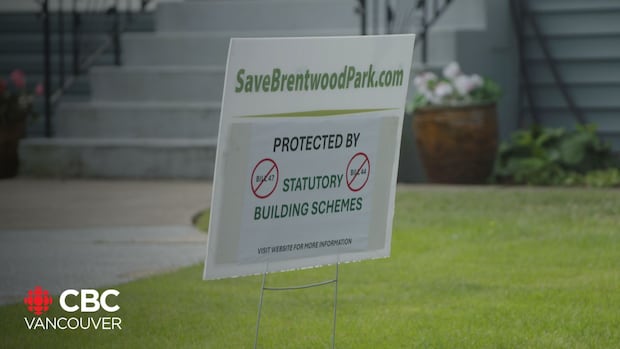Burnaby neighbourhood hopes covenants will defend against density
Brentwood Park property owners say decades-old restrictions would save area from B.C.'s new densification laws

Property owners in the Brentwood Park area of Burnaby, B.C., say they will rely on restrictive covenants put in place in the 1950s to preserve the area's character and single-family homes in the face of provincial density rules.
For months the horseshoe-shaped community of around 500 homes — situated just northeast of the rapidly developing area around the Brentwood Town Centre mall and SkyTrain station — has been lobbying the province for exemptions to Bill 47, which allows for smaller-sized apartment buildings on single-family home lots within 400 to 800 metres of transit hubs.
"That would be the start of the end," said Brentwood Park resident Edward Pereira about the prospect of eight- to 12-storey apartment buildings replacing single-family homes in the neighbourhood.
The area's residents, whose homes are on large lots with plenty of open green space, want it preserved. They argue densification would ruin Brentwood Park's appeal as a quiet, walkable community with strong links between residents.
"This neighbourhood's a gem," said Pereira. "If you were trying to design a neighbourhood, if you were trying to hope for a good neighbourhood, this accomplishes all of it."
However, banding together for a campaign called Save Brentwood Park has not been enough to stop development there.
At least four properties are now the subject of an attempted land assembly, with the purchaser wanting to erect an eight-storey apartment building in their place, according to Pereira.

He says the province is not budging. The city also has no recourse, having to change its zoning to comply with the new provincial housing legislation passed late last year.
As well as Bill 47, it also includes Bill 44, which allows for housing such as four- or six-unit multiplexes in place of single-family homes.
In a statement, the City of Burnaby said it "takes great pride in the character and history of our neighbourhoods."
"However, through changes to provincial legislation, the City of Burnaby, as with all municipalities across the province, are unable to protect single-family neighbourhoods from redevelopment under required Small Scale Multi-Unit Housing zoning."
Covenant defence
That's left Brentwood with one last weapon to defy densification: statutory building schemes, or restrictive private covenants.
These types of agreements between developers, builders and property owners were historically made under sections 219 or 220 of B.C.'s Land Title Act. They were used for a variety of purposes, including limiting density.
Since the passing of the province's new housing bills, they've become what some call an unintended complication to the province's desire to increase housing in places where it's unaffordable, inappropriate or limited.
"Looking at this role of covenants … I think it's just perhaps one of a number of challenges toward final implementation of the housing legislation that was passed just late last year," said Andy Yan, city program director at Simon Fraser University.
The province admits its new housing legislation doesn't supersede private covenants.
But Housing Minister Ravi Kahlon wants communities to ponder whether the often decades-old private agreements are now antiquated.
"Does it make sense in the housing crisis today to still have those covenants in place?" he said.
"I know that conversation is happening in my community and I know it's happening in communities throughout the province."
The housing ministry said in a statement that it "will continue to look into this issue as it focuses on building more homes, faster, in B.C."
It's a change from a week earlier when it urged homeowners to seek legal advice over questions related to covenants.
Experts have said the province could use its powers to pass laws that would universally address certain parts of restrictive covenants that it may deem outdated.
'Defend against both bills'
Records of these types of agreements can be searched through the B.C. Land Title and Survey website, as court challenges are now emerging over them.
The justice system is the only recourse at present to determine whether covenants should be maintained or nullified to increase housing in neighbourhoods like Brentwood Park.
Residents like Pereira say they are betting their neighbourhood will be protected by its restrictive covenants, which specifically call for a certain type of housing.
"What they call for is single-family homes, so that means they, by definition, would defend against both bills [44 and 47], and so that's the reality of that."


